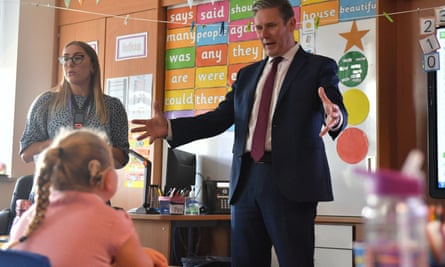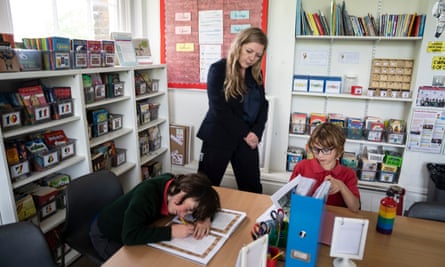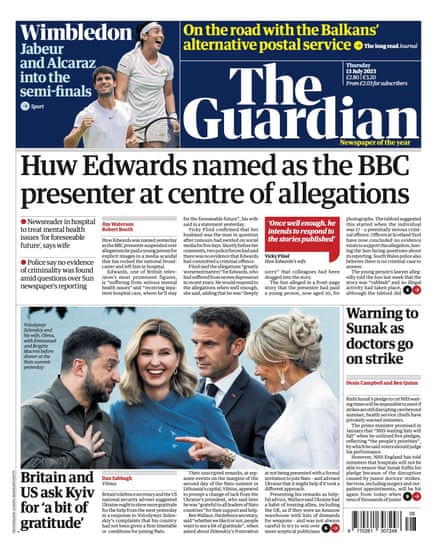Good morning. If you can afford to pay tens of thousands of pounds to educate your children, do you deserve a hefty tax break? That question has long been at the centre of debates over private education in the UK, and the particular tax status of what, by tradition, are known as public schools (yet are anything but).
Private schools in Britain, the majority of which are also registered charities, are exempt from VAT on their fees, meaning they escape the 20% tax that is applied to most other goods and services.
Labour wants to change that. Last week, Keir Starmer (below) reaffirmed the party’s pledge to remove the VAT exemption from private education, and to plough the sums it raises back into the state sector. It’s part of the party’s commitment to breaking the “class ceiling”, the leader said, and challenging one of the most entrenched drivers of privilege in Britain.
The schools themselves warn of a flood of new students into the state system, cancelling out much of the saving. But a new report, published this week, disputes that.
With even schools themselves acknowledging that a Labour government is “increasingly likely”, I spoke to Guardian education editor Richard Adams about what ending the private school tax break would mean for parents, the independent sector and the wider education system.
That’s coming up after the headlines.
Five big stories
-
BBC | Huw Edwards has been named as the presenter suspended over allegations he paid a young person for explicit images. The Sun newspaper – which alleged in a front-page story that the presenter paid a young person, now aged 20 but 17 when it started, for photos – faces questions over its reporting and ethical standards after police concluded there was no evidence to support this allegation of serious criminal wrongdoing. Edwards, one of British TV’s most famous faces, is now receiving inpatient hospital care for “serious mental health issues”, his wife, Vicky Flind, said in a statement on Wednesday.
-
Nato | Joe Biden concluded the Vilnius summit on Wednesday promising Ukraine full support even without membership in the alliance. Leaders only signed off a carefully negotiated declaration promising Ukraine could join after making “democratic and security sector reforms”. Britain’s defence secretary earlier suggested Ukraine should show more gratitude for the west’s help. Separately, Russia’s foreign intelligence chief said he and his CIA counterpart discussed the Wagner mercenary mutiny and “what to do with Ukraine” in a phone call.
-
Science | An “unprecedented” closeup image of the nearest star-forming region to Earth was released by Nasa on Wednesday to mark the first year of operation of the James Webb space telescope. The space agency called it “a dynamic image that belies the region’s relative quiet – and practically begs for explanation of what exactly we are looking at”.
-
Technology | Anthropic, a US artificial intelligence company, has launched Claude 2, a rival chatbot to ChatGPT that can summarise novel-sized blocks of text and operates from a list of safety principles drawn from sources such as the Universal Declaration of Human Rights. The chatbot is publicly available in the US and the UK.
-
Conservatives | Nadine Dorries has been reported to the chief whip and Commons speaker after allegedly sending “forceful” emails to the government about not being given a peerage. In a highly unusual move, the cabinet secretary, Simon Case, said he had “flagged” the issue to the parliamentary authorities, and also asked for advice about any potential breach of the law.
In depth: ‘How much of a public benefit is it when it seems to accrue to the wealthiest parts of society?’

First, a quiz. Who wrote the following:
“[The VAT examption on private schools] allows the wealthiest in this country, indeed the very wealthiest in the globe, to buy a prestige service that secures their children a permanent positional edge in society at an effective 20 per cent discount … [If we want] to end burning injustices in our society, [we] could scarcely find a better way of doing that than ending tax advantages for the global super-rich and instead extending them to the vulnerable and voiceless.”
Jeremy Corbyn? Tony Benn? Nope, that was Michael Gove, currently the Tory secretary of state for housing and communities, writing in the Times in 2017. Gove wasn’t a member of the cabinet at the time, though he has served in several of them – always alongside a disproportionate number of private school-educated peers (in fact, he attended an independent school himself on a scholarship).
So while Labour first adopted the policy under Corbyn, it is not a fringe leftwing argument that tackling the tax break could be a small step towards social mobility.
The arguments in favour
There is plenty of evidence that buying a private education helps buy social advantage – so why should everyone else subsidise it? Two-thirds of senior judges went to private schools, according to research in 2019, and almost as high a proportion of very senior civil servants and members of the House of Lords. The same poll found that the privately educated made up 44% of leading British actors and even almost a third of pop stars.
The proportion of newspaper columnists, by the way, was 44%.

“There is a basic fairness point [behind Labour’s policy],” says Richard. “It’s a transfer of wealth from the wealthy to the less wealthy or to the state.” While not every independent school is a charity (some are run by for-profit companies), most of the best known and most historic private schools are, on the basis that they provide a “public benefit” – which the schools say includes scholarships and other benevolent activities. Labour’s argument, Richard explains, is: “How much of a public benefit is it when most of the benefits seem to accrue to the wealthiest parts of society?”
The party has said it will raise about £1.7bn, which it says it will use to hire 6,500 new teachers and give every child access to a mental health counsellor at school and professional careers advice.
The arguments against
The Independent Schools Council (ISC), which represents the private sector, is unsurprisingly opposed to the change. “They argue that fees would have to go up by 20%, which would make it unaffordable for some parents,” says Richard. “They would have to take the children out of school – which is unfair, because obviously it disrupts their education – and more children would have to go into the state sector, and the government will have to pay for that.”
But the ISC’s projections that up to 20% of parents would remove their children was rebuffed by a new report this week by the Institute for Fiscal Studies. It said the effect would be much smaller, with as few as 3% to 7% switching. It also largely endorsed Labour’s projected sums.
“They also don’t need to slap 20% on fees,” Richard points out. “How much they pass on is up to the schools. If adding 20% to fees causes everyone to leave, they won’t do that. They will do what state schools have to do over the years, and maybe have bigger class sizes or sack a couple of the undergardeners or not gild the chapel organ every few years.”
An “arms race” between major schools competing for pupils in recent years has driven ever more lavish facilities, he says, which partly explains rising school fees across the sector – the average fee for day school is now £16,656 (up 37% on 2013). “Private schools have been putting their fees up year on year, continuously for 20 years. But, the number of pupils hasn’t really changed at all, in fact it’s gone up slightly.”
Unintended consequences

One thing to note, however, is that not every school in the independent sector is a well-known historic institution with deep pockets, says Richard.
“There are actually a large number of private schools which look nothing like Eton and Winchester. They’re very small, community-run or run by parents or particular religious groups, for example. And ironically, they may be affected the worst by this.”
While the Labour policy exempts special-needs schools, he cites the example of a small Welsh-language primary school in London (pictured above), or local Muslim or Jewish schools, whose fees may be just a few thousand pounds a year, and which could struggle if VAT were added.
after newsletter promotion
“So it may be that the schools that really suffer and close may be the ones that Labour is not really thinking about. The Etons and Winchesters have survived through wars and plagues and everything else, they’ll be fine.”
What else we’ve been reading

-
The inconvenience of England’s unreliable public transport can be infuriating, but Sophie Pavelle writes that it is still full of untapped potential. After challenging herself to take low-carbon routes as she travelled the country while writing her book, Pavelle revelled in the slower pace and the beauty in going by train. Nimo
-
“Who wants to be a Ken?”: Rich Pelley gets into the mind (and clobber) of Barbie’s suitor for the day to find out the truth about the wind beneath her wings. Hannah J Davies, deputy editor, newsletters
-
Most of the country’s political establishment – past and present – loudly condemned the actions of the person who threw orange confetti on George Osborne and his new wife on their wedding day. But Owen Jones writes that these kinds of peaceful, attention grabbing actions will continue until there is real, rigorous scrutiny in our political system. Nimo
-
Time to bin your I Heart NY T-shirt: the NYT (£) looks at the rise of a new market-stall must-have in the Big Apple: Daddy’s/Mommy’s Little Meatball apparel. Hannah
-
As the environmental toll of over consumption becomes ever more apparent more people are opting to rent clothes, especially costly “special occasion” pieces. Chloe Mac Donnell spoke with four people who have managed made the rental economy a lucrative side hustle. Nimo
Sport

Wimbledon | Daniil Medvedev ended Chris Eubanks’s SW19 fun 6-4, 1-6, 4-6, 7-6 (4), 6-1 and will play a semi-final against the world No 1 Carlos Alcaraz who put out Holger Rune 7-6 (3), 6-4, 6-4. Aryna Sabalenka powered past Madison Keys 6-2, 6-4 to set up a semi-final against Ons Jabeur who knocked out Elena Rybakina 6-7 (5), 6-4, 6-1.
Football | Nottingham Forest defender Harry Toffolo has been charged by the Football Association with breaching its betting rules on 375 occasions. It is alleged Toffolo was in breach of FA rule E8 between January 2014 and March 2017, while contracted to Norwich. Toffolo, who made 19 Premier League appearances last season, has until 19 July to respond.
Football | Fulham have rejected a £25.5m bid from Saudi Pro League side Al-Hilal for Aleksandar Mitrović, with the Premier League club adamant their talisman is not for sale. Mitrović is the latest player to attract serious interest from the Gulf state and is thought to be open to the move. Karim Benzema, N’Golo Kanté and Roberto Firmino are among those to have signed up to playing in Saudi next season.
The front pages

You can see the major front pages here in a separate wrap-up today – a potted version follows. The Guardian newspaper’s lead story for Thursday morning is “Huw Edwards named as the BBC presenter at centre of allegations”. The i headlines its story “Huw Edwards in hospital for mental health care, says wife”. The Sun leads with “Suspended top BBC presenter in hospital”, adding “‘No crime’ … but Beeb make shock new claims”. The Times has “Wife reveals Huw Edwards is BBC star in eye of storm”. The Daily Mail headlines its story “My husband has serious mental health issues”. The Daily Mirror says there’s a “Crisis at the Beeb”, headlining its story “BBC star Huw’s in hospital after scandal”. The Metro references the rumours with the headline “It is Huw Edwards”. The Daily Telegraph says “Huw Edwards named by wife as presenter suspended by BBC” while similarly the Daily Express goes with “Huw Edwards’ wife names him as star in BBC scandal”. It’s on the front of the Financial Times too but the splash is “Big drop in US inflation raises hopes that ‘fever is breaking’ after rate rises”.
Today in Focus

Will Mark Zuckerberg’s Threads unravel Twitter?
Meta has launched what it promises will be a kinder alternative to Twitter. Can it deliver? Dan Milmo reports
Cartoon of the day | Ben Jennings

The Upside
A bit of good news to remind you that the world’s not all bad

In the depths of lockdown in a big new city, Nikita Sharma (pictured above) found herself longing for the warmth of her parents’ company, cooking and home in Delhi. After one particularly cheerful dinner party with her parents’ friends over the new year break, Sharma decided it was time to use food to forge some community in London. Cooking did not come naturally to her, but 2022 was the year she decided to learn. Over the next few months, with the help of her friends, Sharma went from messing up basic pasta dishes to rolling out sweet potato gnocchi from scratch. She ventured into culinary territories new to her with pastries and bread, which helped her understand that learning and growth come in ways that you would not have anticipated sometimes. Sharma’s new hobby gave her an excuse to deepen her friendships through elaborate dinners and more spontaneous occasions: “Cooking became more than a means of sustenance. It became a way to share happiness and time,” Sharma writes.
Sign up here for a weekly roundup of The Upside, sent to you every Sunday
Bored at work?
And finally, the Guardian’s puzzles are here to keep you entertained throughout the day – with plenty more on the Guardian’s Puzzles app for iOS and Android. Until tomorrow.
Stay connected with us on social media platform for instant update click here to join our Twitter, & Facebook
We are now on Telegram. Click here to join our channel (@TechiUpdate) and stay updated with the latest Technology headlines.
For all the latest Education News Click Here
